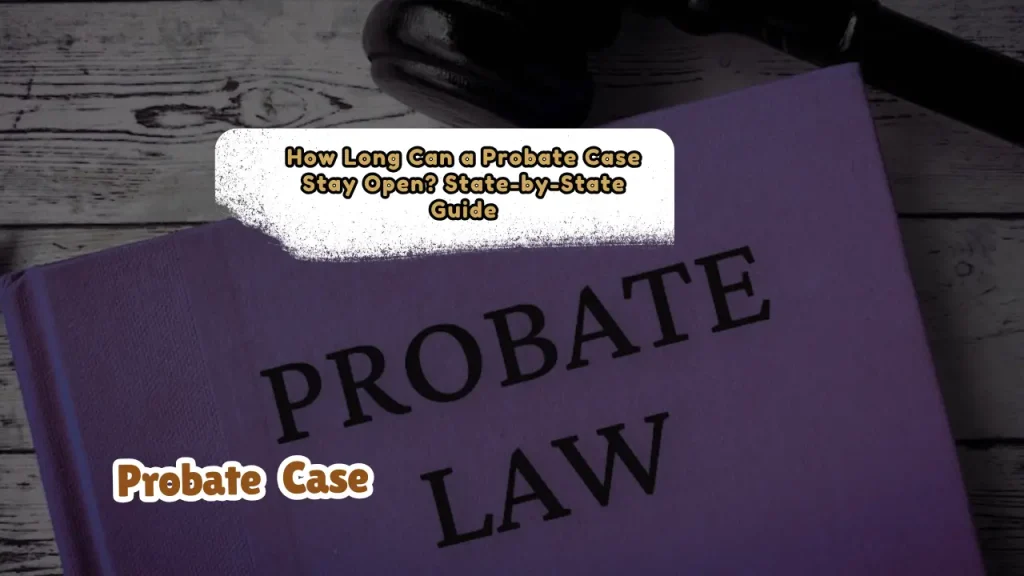How Long Can a Probate Case Stay Open? State-by-State Guide
Most probate cases take 6–18 months to close, but complex estates (e.g., disputes, tax issues, or out-of-state property) can remain open for 2–5 years or longer. State laws rarely set strict deadlines, but courts can pressure executors to resolve cases efficiently.
Probate is the legal process of settling a deceased person’s estate, but its duration can vary widely depending on complexity, state laws, and potential disputes. While some cases wrap up in months, others drag on for years. This article breaks down the factors affecting probate timelines, state-specific rules, and tips to avoid unnecessary delays.
Table of Contents
Key Factors Affecting Probate Duration
1. Estate Complexity
- Simple Estates: No will, minimal assets, and no disputes. Closes in 6–12 months.
- Moderate Estates: Valid will, some debts, or real estate. Takes 1–2 years.
- Complex Estates: Business interests, lawsuits, or federal estate taxes. Can take 3+ years.
2. Will Contests or Disputes
- Heirs challenging the will’s validity can stall probate for 1–3 years.
- Example: A California case (Estate of Hilton) took 12 years due to family disputes.
3. Tax Issues
- Federal Estate Tax: Estates exceeding $13.61M (2024) require IRS filings, adding 6–12 months.
- State Inheritance Tax: States like Pennsylvania or Nebraska impose additional taxes and deadlines.
4. Real Estate Sales
- Selling property in a slow market or resolving title issues can delay probate by 6–12 months.
5. Missing Heirs or Beneficiaries
- Locating unknown heirs (e.g., estranged relatives) may require court petitions and public notices, extending timelines.
State-by-State Probate Timelines
| State | Average Duration | Unique Rules |
| California | 12–18 months | Complex cases often take 2+ years. |
| Texas | 6–12 months | Independent administration speeds up probate. |
| Florida | 9–24 months | Homestead property disputes add delays. |
| New York | 12–24 months | Surrogate Court reviews prolong cases. |
Why Some Probate Cases Stay Open Indefinitely
- Ongoing Lawsuits: Beneficiaries suing the executor or each other.
- IRS Audits: Prolonged tax disputes.
- Estate Assets Generating Income: Trusts or rental properties may keep the estate open for years.
Related article for you:
Can You Borrow a Loan to Buy a Probate Home? Strategies for Success

Legal Limits on Probate Duration
Most states don’t impose strict deadlines, but exceptions include:
- California: Executors must file an inventory within 90 days of appointment (Probate Code § 8800).
- Texas: Estates should close within 1 year unless extended (Estates Code § 362.005).
- Florida: Creditors have 2 years to file claims, effectively capping probate at 2–3 years (Fla. Stat. § 733.710).
Consequences of a Lengthy Probate
- Heir Frustration: Delays in receiving inheritances.
- Asset Depreciation: Property may lose value if maintenance is neglected.
- Executor Liability: Personal liability for mismanagement over time.
How to Speed Up Probate
- File Paperwork Promptly: Submit the will, death certificate, and inventory early.
- Avoid Disputes: Mediate conflicts privately to prevent court battles.
- Sell Assets Quickly: Liquidate property and investments ASAP.
- Hire a Probate Attorney: Streamline compliance with state laws.
- Use Simplified Procedures: For small estates (e.g., California’s Affidavit for Small Estate).
When to Ask the Court for an Extension?
Executors can request more time for valid reasons:
- Pending lawsuits.
- Complex tax filings.
- Slow real estate sales.
- Example: A Texas executor extended probate by 6 months to resolve a business valuation dispute.
FAQs
Can probate stay open forever?
No. Courts can force closure if executors stall unreasonably.
What’s the shortest probate timeline?
Small estates using affidavits can close in 2–4 weeks (e.g., Arizona, Ohio).
Can heirs speed up probate?
Yes. They can petition the court to replace a slow executor.
Does probate ever end automatically?
No. Executors must file a final account to close it formally.
Key Takeaways
- Most probate cases close within 6–18 months, but complexity or disputes can extend them for years.
- State laws rarely set strict deadlines, but courts expect timely progress.
- Executors should prioritize asset liquidation, debt payment, and heir communication to avoid delays.
Need Help?
- State Probate Guides: California Courts | Texas Law Help
- Find an Attorney: American College of Trust and Estate Counsel
Final Thoughts
While probate can feel endless, understanding the factors behind delays empowers you to take control. Whether you’re an executor or heir, proactive communication and legal guidance are key to resolving the estate efficiently. For complex cases, consult a probate attorney to negotiate deadlines and keep the process on track.
Note: Timelines vary. Always consult a local attorney for case-specific advice.
About the Author

Sarah Klein, JD, is an experienced estate planning attorney who has helped clients with wills, trusts, powers of attorney, and probate matters. At All About Lawyer, she simplifies complex estate laws so families can protect their assets, plan ahead, and avoid legal headaches during life’s most sensitive moments.
Read more about Sarah
